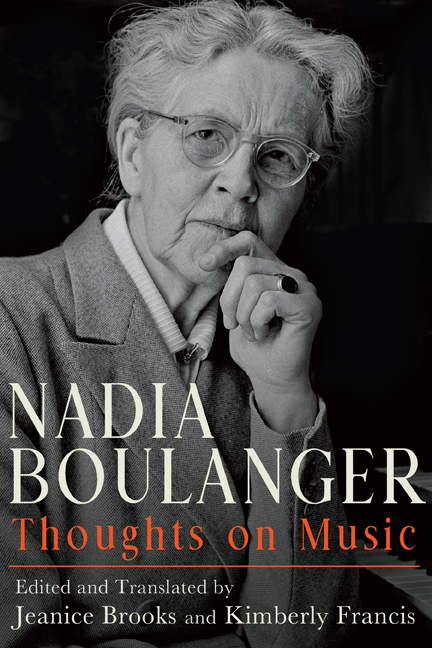Book contents
- Frontmatter
- Contents
- List of Illustrations
- Acknowledgments
- Editorial Apparatus and Critical Notes
- Note on Translations
- List of Abbreviations
- Timeline of Nadia Boulanger’s Life
- Introduction
- Part One Journalism, Criticism, Tributes
- Part Two Lectures, Classes, Broadcasts
- Bibliography of Nadia Boulanger’s Published Writing
- General Bibliography
- Index
“Le Piano, Cours d’Interpretation de Mlle. Nadia Boulanger—Mozart,” Le Monde musical 47, no. 7 (July 1936): 211-12 (complete text)
Published online by Cambridge University Press: 15 October 2020
- Frontmatter
- Contents
- List of Illustrations
- Acknowledgments
- Editorial Apparatus and Critical Notes
- Note on Translations
- List of Abbreviations
- Timeline of Nadia Boulanger’s Life
- Introduction
- Part One Journalism, Criticism, Tributes
- Part Two Lectures, Classes, Broadcasts
- Bibliography of Nadia Boulanger’s Published Writing
- General Bibliography
- Index
Summary
Mademoiselle Nadia Boulanger's Masterclass
Mozart
Before beginning the performance of Mozart's works identified on the course syllabus, Madmoiselle Nadia Boulanger improvised a chat, in which she reminded us of certain aspects of the Salzburg master's life. Even though they are familiar enough, they contributed to creating immediately a favorable atmosphere for the performance of some of his piano works. We therefore thought it worthwhile to recreate them for our readers.
Some aspects of Mozart's life
Mozart had only a very short life; he died at the age of 35 but, despite that, he produced a large quantity of music. He wrote tirelessly with disconcerting facility and a marvelous style. His works are innumerable, and the majority are masterpieces, if not all. Mozart was a prodigy, a real miracle of nature, a musician who seemed to come into the world already knowing what others take such a long time to learn.
One day, a violinist brought two trios to Mozart's father, who was a musician and, simultaneously, his son's first teacher. For the performance of the trios, they needed a second violin. The child, who was five years old at the time, asked his father's permission to fill the gap. Laughing, his father replied, “but you don't know how to play the violin.” But the little one, claiming that it couldn't be that tricky, insisted so much that he was allowed to, and it was observed with astonishment that he filled the role very well.
Some months later, his father came upon him scribbling some notes on a piece of music paper. When asked, little Wolfgang said that he was writing a piano concerto and, he added, the first part was already finished.
The father was very intrigued, but, since his son did not want to show him a single note, the father had to use his cunning and secretly inspected the little one's work. Mozart's father was stunned by his son's already accomplished writing. Where had his little one learned this? The answer was hardly difficult. Curious by nature, the little Mozart listened in secret to what his father said and taught to other students, and he took advantage of that for himself.
- Type
- Chapter
- Information
- Nadia BoulangerThoughts on Music, pp. 345 - 352Publisher: Boydell & BrewerPrint publication year: 2020



